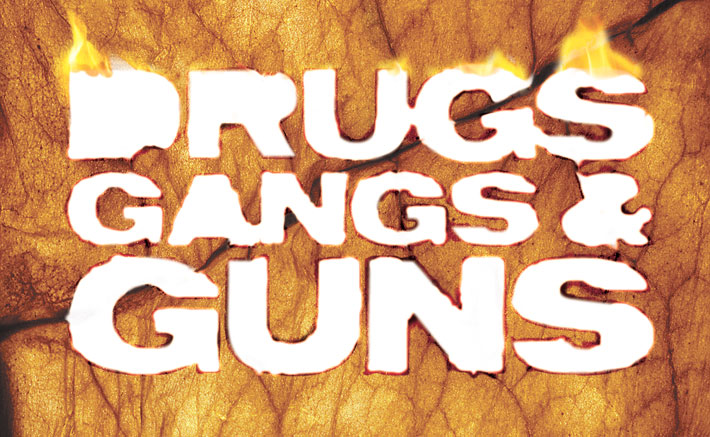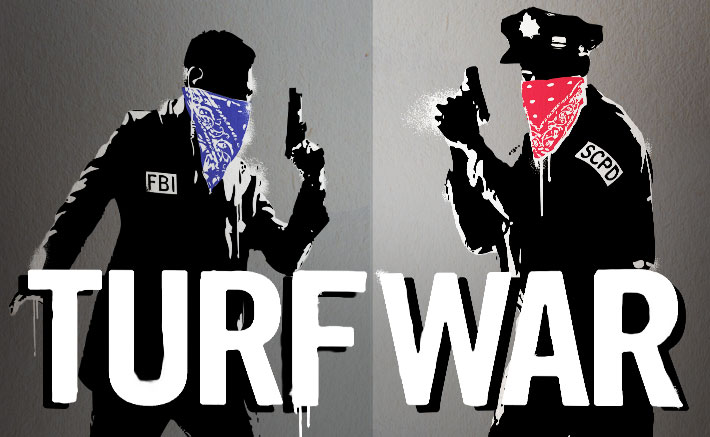

From left: Kreem “Ghost” Jackson, alleged leader of the Bellport set of the bloods; Howard “Mousey” Davis, his sidekick; Helen “Pell” Davis, Mousey’s sister; and brothers David and James Brown, the alleged triggerman and getaway driver in the shooting of a security guard on the Poospatuck Reservation.
LEADER OF THE PACK
One gang member in particular was sought out to work the smoke shop “because of his perceived strength on the street,” Spota’s spokesman Robert Clifford tells the Press. How much the unidentified Unkechaug knew about the drug dealing, however, remains unclear.
David Brown, 31, was the gang member who was asked to run Indian Creek Smoke shop and who later shot the security guard, prosecutors say. Brown answered to his leader, a 29-year-old named Kreem “Ghost” Jackson.
Ghost was the reputed ringleader of The G-Shine or Gangsta Killa Bloods. Well before the gang went into retail, Jackson—whose nickname is emblazoned on his wrist and ankle in a pair of ghost tattoos—had earned persistent felony offender status, which means stiffer sentencing. He is a level 2 sex offender. His rap sheet includes convictions for attempted assault, drugs and raping a 14-year-old girl.
Jackson is also an accused pimp.
“This is a bad guy,” Spota says, pointing at a printout of Jackson’s mugshot sitting on a coffee table in the Hauppauge office from where the DA took down a half dozen local politicians in the past decade, including the current county executive. He adds that documents and a series of wiretaps helped his team piece together exactly what had happened at The Rez—and who was calling the shots.
“Paperwork showed that [Indian Creek] was owned and operated by a Native American Indian of the Poospatuck reservation,” explains Spota. “In reality, the wiretap clearly disclosed that Ghost was running the smoke shop.”
It was Jackson who, along with Brown and his 28-year-old brother, James, offered a $10,000 bribe to the wounded security guard to lie to police and say he mistakenly fingered the wrong suspects, according to Spota.
The bribe also came with a catch, say authorities: If the guard refused, there would be more bloodshed.
This threat and the G-Shine’s smoke-shop takeover were revealed in subsequent wiretaps implemented by prosecutors following the Brown brothers’ arrests for the security guard shooting. The arrests came down before any money could exchange hands or stories could be changed.
Prosecutors allege a laundry list of nefarious deeds taking place within the smoke shop’s walls: feeding drugs to prostitutes to maintain the gang’s control of them, leading a platoon of drug dealers, waging war on rival gangs, and, of course, witness intimidation.
“[JACKSON] had his fingers in a lot of different pies,” William Madigan, deputy inspector with Suffolk police assigned to the District Attorney Squad, tells the Press.
“He had a very extensive drug trade,” Spota adds.
Suffolk police have taken turns stamping out gang violence flare-ups in Huntington Station, Central Islip and most recently, Brentwood, where four people were slain by street violence in a six-week span this spring. Both Mastic and Bellport have seen enough bloodshed to garner added police attention as well.
The Bloods, one of the largest gangs on LI, are among the usual suspects. The silver lining in the Poospatuck case is that no one was killed—this time. Nor are The Bloods the first bullies to muscle their way onto the smallest reservation in the state.
Poospatuck’s most notorious smoke shop operator, Rodney Morrison—who married into the tribe—was sentenced last year to 10 years in federal prison for gun possession after being acquitted of murder, robbery and arson.
Federal authorities say Carlos Pascal, a half brother of Morrison, laundered $30 million of Morrison’s cash in Costa Rica. Pascal, who allegedly used the money to buy a Costa Rican soccer team and build a real estate empire in the Central American nation, was arrested in June.

A surveillance camera captured a suspect allegedly shooting a security guard on the Poospatuck Reservation last year
By mid-December, Suffolk authorities had heard enough on the wiretaps to begin executing eight simultaneous search warrants to make sure those arrested didn’t tip off their alleged co-conspirators. Also seized in the raids were a sawed-off shotgun, a crossbow and two handguns—including a 9mm pistol linked to a Sayville home invasion.
When Jackson was apprehended, he was armed with a loaded .45 caliber Smith & Wesson semiautomatic pistol, according to the criminal complaint against him.
Howard “Mousey” Davis, Ghost’s lieutenant who is also a convicted felon, was also taken in, along with Davis’ sister, Helen, and mother, Karen. The women are two of a dozen alleged drug-runners in the case, although Karen is not a member of the Bloods.
Additionally, Jackson and another suspect were accused of firing guns into a Shirley house in a gang dispute days before the Poospatuck shooting last September. And that’s not the end of his legal woes.
Christopher Cassar, the Central Islip-based attorney representing Jackson, says police have been “harassing” his client, who has also been questioned about a Halloween party murder at a Hampton Bays night club last year—although Cassar says Jackson is not considered a suspect.
“We believe that these charges are extremely weak,” Cassar says. “Everything is based on telephone conversations, which can be taken out of context.”
All but two of the accused pleaded not guilty in Suffolk County court earlier this year. Helen “Pell” Davis pleaded guilty. She was sentenced to time served and 15 years probation for burglary, attempted assault, intimidating a witness, criminal mischief and drug dealing. Her daughter, Karen, pleaded guilty in July and will be setenced Sept. 21.
Attorneys for the Brown brothers, Karen “Candy” Davis and her son did not return calls for comment. No arrests have been made in connection with the smoke shop robbery and Sayville home invasion. Both are still under investigation.
With a total of 14 suspected outlaws sitting in Suffolk jail while facing a laundry list of charges in the alleged conspiracy to take over the smoke shop, a fragile peace on Poospatuck has returned—for now.
Exactly how this case will affect the tribe’s attitudes toward outside law enforcement remains unclear. The gang infiltration-tobacco store takeover is just one of several pressing issues confronting the Unkechaug these days.




